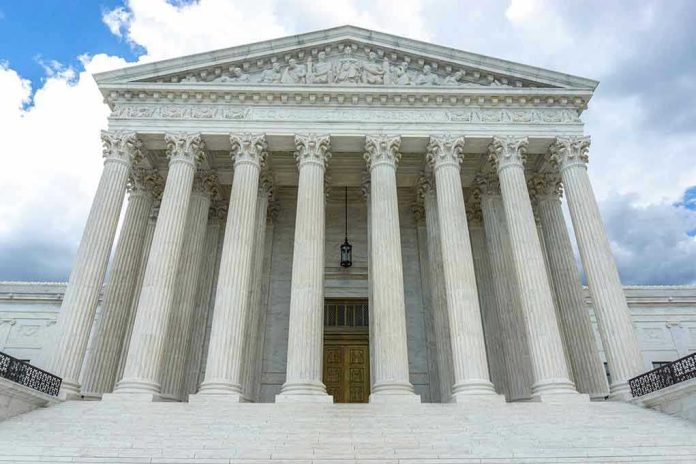
The fate of a little-known Washington official could redraw the map of presidential power—and you may soon care more about the Register of Copyrights than you ever imagined.
Story Snapshot
- Donald Trump’s Supreme Court bid could let presidents fire the Register of Copyrights at will
- The case tests the boundary between executive power and agency independence
- The decision may ripple through federal agencies, shifting the balance of U.S. governance
- Stakeholders from Hollywood to Silicon Valley are fiercely divided over the outcome
Trump’s Supreme Court Gambit: Copyright, Power, and Precedent
Donald Trump’s petition to the Supreme Court is not about Hollywood blockbusters or TikTok trends, but about the raw machinery of government. Trump’s legal team demands that the President, and not Congress or the Librarian of Congress, have the power to fire the Register of Copyrights—the person who shapes how creative rights are recognized and protected. The Supreme Court’s ruling could upend over a century of agency independence, echoing far beyond the walls of the Copyright Office and into the heart of the administrative state.
The Register of Copyrights is not a household name, yet this office quietly influences disputes worth billions. Traditionally, the Register answers to the Librarian of Congress and enjoys insulation from political firings. Trump’s challenge, filed in 2023 and now before the Supreme Court, argues that statutory job protections for the Register violate the Constitution’s separation of powers. At stake: whether presidents get a freer hand to remake federal agencies in their own image, or whether Congress can shield certain experts from White House whims.
Unitary Executive Theory and the Shadow of Precedent
Trump’s legal argument is rooted in the “unitary executive theory,” a doctrine contending that all executive branch officials must be subject to presidential control. This theory gained traction after the Supreme Court’s Seila Law LLC v. CFPB (2020) decision, which allowed the President to fire the Consumer Financial Protection Bureau head at will. Now, Trump’s team wants that same logic applied to the Register, who oversees copyright policy and registration. Critics warn that such a shift risks making copyright policy a political football, endangering impartial enforcement and stability.
Legal scholars, industry giants, and copyright stakeholders have poured in amicus briefs, some warning that undermining the Register’s independence could invite chaos in copyright regulation. Others side with Trump, calling the Register’s current protections a relic that stymies accountability and hobbles decisive leadership. The entertainment industry and tech sector, usually at odds, find themselves equally anxious—though for different reasons—about how a less independent Register might rewrite the rules of creative ownership and digital innovation.
What’s at Stake: Creative Policy and the Administrative State
The Supreme Court’s decision, expected by June 2025, stands to affect more than just one office. If the President wins expanded removal powers over the Register, other independent agency heads—from financial watchdogs to energy regulators—could soon see their statutory protections eroded. Federal employees, especially those in specialized roles, face the specter of abrupt leadership changes with every election. Industry stakeholders brace for potential policy whiplash, as new Registers may bring radically different enforcement priorities.
The political consequences are just as acute. The ruling could become a rallying cry in the ongoing clash over the “administrative state”—Washington’s network of regulatory agencies whose independence some view as a bulwark against tyranny, others as an obstacle to democracy. Congress may respond with new legislation to clarify or restore agency independence, setting the stage for a constitutional tug-of-war that could last for years. For ordinary Americans, the decision could eventually shape what art gets made, who gets paid for it, and how new technologies are regulated.
Divided Voices: The Debate Beyond the Bench
No consensus has emerged among legal experts. Conservative circles generally applaud Trump’s push as a return to constitutional order, while progressive and centrist analysts warn of regulatory capture by future presidents. The Harvard Law Review and Brookings Institution both highlight the risks of destabilizing federal governance if agency independence further erodes. Former officials caution that politicizing the Register’s position could undermine trust in copyright administration, a worry shared by many in the creative community. The national debate, once confined to law journals, now plays out in editorial pages, industry meetings, and heated social media threads.
Public hearings and media coverage have drawn unusual attention to the once-obscure Copyright Office. For the first time in decades, lobbyists from Hollywood and Silicon Valley find themselves fighting on the same battlefield, their fortunes tied to a Supreme Court ruling that could tilt the rules of creative commerce. The case’s outcome will either reinforce the long-standing checks and balances on executive authority or set a precedent for greater presidential control—an issue that may well shape the next election cycle and the very structure of American governance for years to come.







